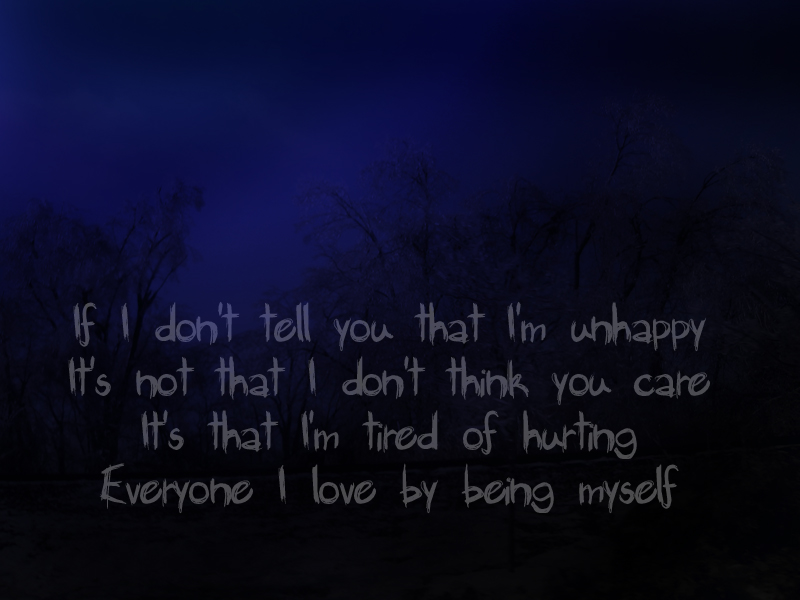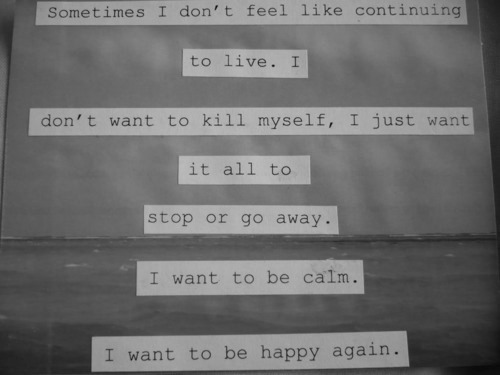
So, I was reading Wil Wheaton's post about paparazzi-induced depression and sharing it. During the share, my commentary started turning into a blog post, so here it is instead. This is part of what I posted it with:
I wish Dispel Depression was something anyone could cast. This is more than just the depression, though. But also, it is about depression.
Pretending it isn't there is destructive. You can't fight something while ignoring while it's tearing little pieces off of you. You shouldn't just fall into a ball of 'I can't', but you have to acknowledge that the monster is there, punch it in the nose if you can and just talk about the thing until it gets sick of hearing about itself and leaves.
After I wrote that, I realized that the first thing my friends who suffer with depression would say is:
Other people don't want to hear it.
 |
| Once you let it get this bad, you're close to losing them. |
If you don't want to hear your friend talking about their depression and pain, you aren't alone. It's hard as hell, even when you have depression, to hear someone going on about how they're hurting and there's nothing you can do about it.
Maybe you feel like they're not doing anything about it -- you would be wrong. If they're talking to you, then they're reaching out for help. They're trying to talk through it. Sometimes that works, and sometimes it doesn't. Sometimes it's so bad that you have to keep slogging through until you come out the other side. Sometimes it's environmental, and you can't change the environmental trigger for whatever reason (sometimes it will lead to a worse situation, sometimes you're just trapped).
 |
| ...want to be happy again. |
And if you're "sucking it up" because you're suffering and think you need to just keep it to yourself? You're an idiot. Stop it. It's not healthy, you won't get better, you're only hurting yourself for stupid reasons (because there is never a good reason to hurt yourself or suffer alone). Further, trying to apply your own crappy beliefs about suffering in silence on other people is horrible. It is a bad thing to do. Don't do it. Get help.
 It's programming by a society lacking in empathy. Sure, it's probably relatively decent population control, and all nature cares about is breeding. It doesn't care about society or community or happiness or growth. It cares about popping out kids. After that, it doesn't give a shit about you. You can tumor it up and die for all nature cares at that point. And society used to operate on protecting itself from the pain of that truth. We're growing past that. Time to come into the present and leave those outdated, unhelpful models behind.
It's programming by a society lacking in empathy. Sure, it's probably relatively decent population control, and all nature cares about is breeding. It doesn't care about society or community or happiness or growth. It cares about popping out kids. After that, it doesn't give a shit about you. You can tumor it up and die for all nature cares at that point. And society used to operate on protecting itself from the pain of that truth. We're growing past that. Time to come into the present and leave those outdated, unhelpful models behind.Some of the most brilliant minds were ravaged and eventually ended by depression. Things that you may enjoy today may have been brought to you by people who were suffering. It wasn't the suffering and pain that brought it (most of the time), and if they'd had help getting through it (suicidal thoughts are temporary, it's about getting through the cycle), maybe you'd have even more awesome works from them.
Yes, it's okay to have limits. No, I don't have an answer for expressing them. Honestly, if everyone would get over the whole idea of dismissing and rejecting people who are in pain, there would be a better distribution of that pain. More chances to talk it out and find things to focus on getting away from the depression monster would be available.
Because that thing is horrible, and decent human beings can't let it win.

